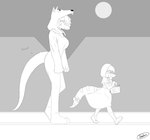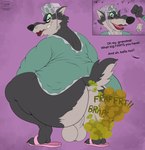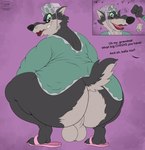
Character: big bad wolf
| Little Red Riding Hood | Three Little Pigs | The Boy Who Cried Wolf | The Wolf and The Seven Little Goats |
|---|---|---|---|
| post #2759058 | post #3517072 | post #4720434 | post #4549201 |
| Red Riding Hood -Gustave Doré | Three Little Pigs Straw House -Leonard Leslie Brooke | The Boy who Cried Wolf -Francis Barlow | Der Wolf und die sieben Geißlein -Oskar Herrfurth |
The Big Bad Wolf is a stock antagonist featured in dozens if not hundreds of fables, fairytales, and stories for over 2000 years. The earliest depictions of the wolf come in Aesop's Fables. Their are over 50 separate Fables featuring a wolf and the vast majority of them involve him as an antagonist. The two most famous ones are "The Boy Who Cried Wolf" and "The Wolf and The Lamb". Since then, the Big Bad Wolf and Wolves in general have played an antagonistic role more than most other animals with the exception of snakes/dragons and foxes in fables and fairytales.
The 3 Major Codifiers of the modern perception of the Big Bad Wolf are Grimm's Fairytales:
As well as Peter and the Wolf by Sergei Prokofiev. The thing that most depictions of The Big Bad wolf have in common is their ravenous hunger and willingness to devour everything in sight. They are often used a metaphor for the negative consequences of young children disobeying their elders in cautionary tales:
- Peter doesn't listen to his grandfather and his animal friend gets eaten.
- 2 out of the 3 little pigs don't listen to their mother and get eaten.
- Little Red Riding Hood doesn't listen to her mother and both she and her grandmother get eaten.
- The Shepherd Boy does not listen to the villagers and his flock gets eaten.
Another aspect of The Big Bad Wolf that was partially codified by Disney or all people is The Big Bad Wolf's deceptive nature. Disney's version of The Big Bad Wolf is known as Zeke Wolf. He appeared in 5 shorts and frequently cameos in other Disney media. Due to the amount of features depicting Zeke Wolf, Zeke's behavior has began to take on a similar cat and mouse plot structure to that of Tom & Jerry and Looney Tunes. This depiction of the wolf was also an inspiration for Avery Wolf, a recurring characters in MGM Cartoons by Tex Avery. This aspect has been present in The Big Bad Wolf's character long before these characterization. Most notably when the Wolf deceives Little Red Riding Hood into straying from the path and revealing the location of her grandmother's house. Later in the same story, the wolf disguises himself as her grandmother.
Over time, the perception of the Wolf as being unredeemable and evil on principle has been called into question. 1989's "The True Story of the 3 Little Pigs by by Jon Scieszka and Lane Smith tells the story of The 3 Little Pigs from the perspective and portrays the events of the original fairytale as a misunderstanding. Other adaptations that invert, subvert, or deconstruct the Wolf's character archetype include:
- Loopy de Loop from Hanna-Barbera
- Bigby Wolf from Fables
- Wolf W. Wolf from Hoodwinked!
- BB Wolf from BB Wolf and the Three LPs
Still, many wolves even in modern media take on roles of antagonism and deception:
The following tags are aliased to this tag: big_bad (learn more).
This tag implicates fairy_tales (learn more).
Posts (view all)



